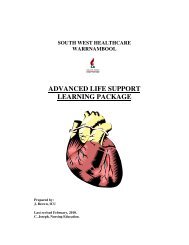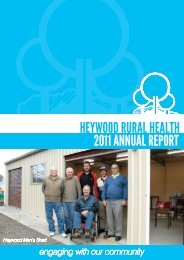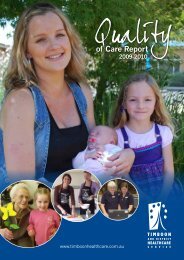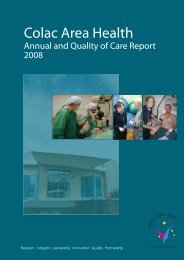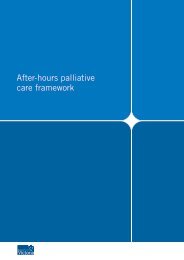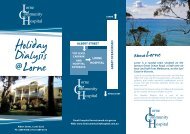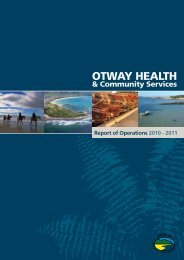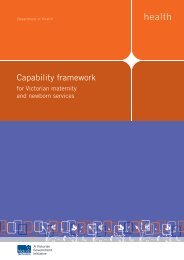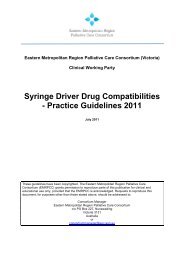Self Directed Learning Package - University of Queensland
Self Directed Learning Package - University of Queensland
Self Directed Learning Package - University of Queensland
- No tags were found...
Create successful ePaper yourself
Turn your PDF publications into a flip-book with our unique Google optimized e-Paper software.
144 • The Palliative Approach ToolkitArtificial hydration is usually administered via a small cannulaplaced under the skin (a subcutaneous SC drip). Althoughartificial hydration can be useful to treat reversible causes <strong>of</strong>dehydration, it is not normally used when a resident is expectedto die within 48 - 72 hours.Thinking PointThink about how you feel if you forget to have a drinkduring your eight hour shift at work. Do you feel alittle drowsy, have a headache, dry mouth or dizzinessif you stand up quickly? Perhaps you just feel thirsty.Having a drink makes you feel better because itmoistens your mouth.Similarly, moistening the mouth <strong>of</strong> a resident who can no longerswallow fluids will keep them comfortable as much as or moreso than a ‘drip’.Key PointMedication side effects, oxygen therapy andmouth breathing can cause a dry mouth. Artificialhydration does not usually relieve the feeling <strong>of</strong>dry mouth and can actually worsen respiratorysecretions, incontinence, vomiting, swelling(oedema) or breathing difficulties.WriteDocument your actionsMany residential aged care facilities expect careworkersto document information on assessment charts and in theclinical record. If this is part <strong>of</strong> your role, try and avoid generalstatements. Be as specific as possible.Avoid general statementsPOOR COMMUNICATIONGOOD COMMUNICATIONEvaluation <strong>of</strong> artificial hydration ‘with ‘Resident denies thirst or discomfort,effect’ or ‘effective’.mouth moist and intact, urinary outputstill moderate’.ReviewEvaluate and reassess as necessaryJust because artificial nutrition or hydration has been started doesnot mean that it should be continued until the resident dies.Artificial hydration needs to be reviewed regularly by the nurseand doctor to ensure it is still the most appropriate interventionfor the resident. In the terminal phase, assessment shouldoccur daily.You will learn more about the importance <strong>of</strong> oral care in a latersection <strong>of</strong> this learning package.



